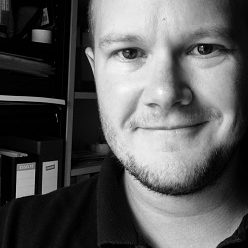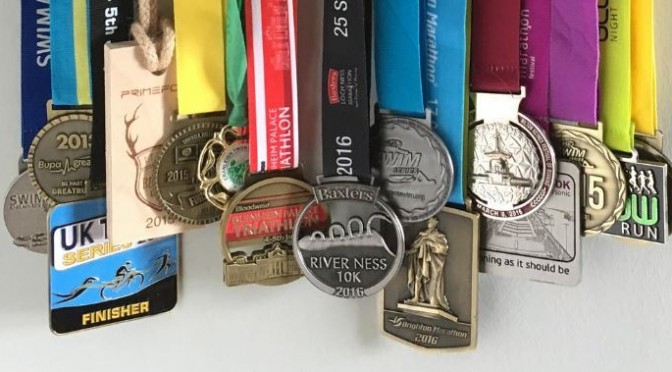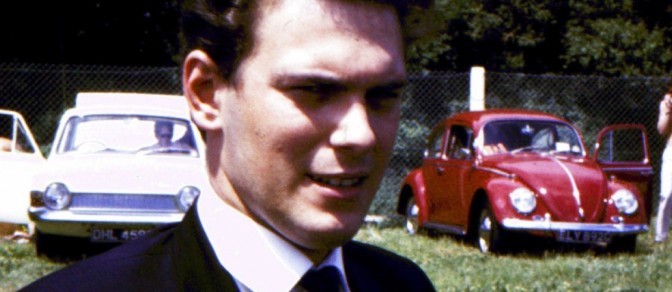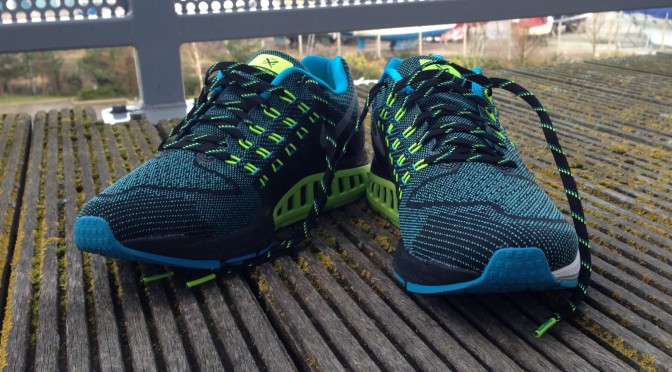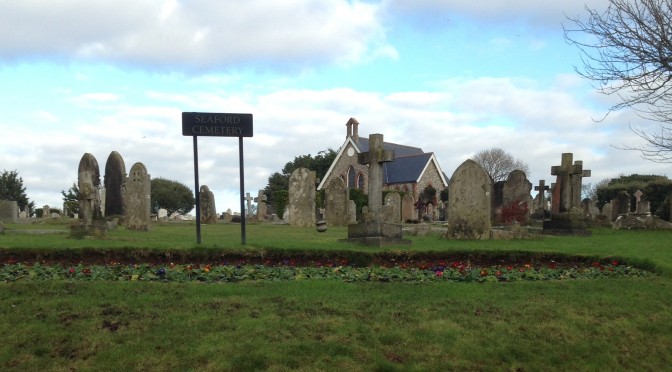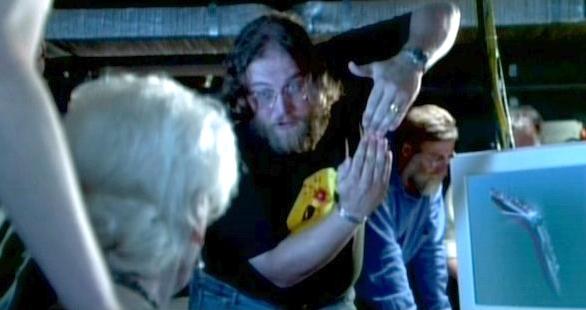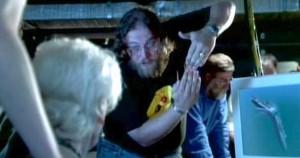Unless you’re living in a cave, or a foreign country, you’ll have noticed it was bonfire night on Saturday. I’ve mentioned before that bonfire night was my dad’s birthday so that seems like a good enough reason to write the post that I’ve been meaning to do since April, but never quite got round to.
Yesterday, I had a hospital appointment (related to August’s health drama rather than the recent one, it’s been one of those years). Since St Wilf’s is just around the corner from the hospital mum and I decided to pop in for coffee and take in the last bit of cash from the fundraising efforts of the last two years.
It was only meant to be a year, you see. The plan was that I’d spend 2015 on five completely out of character sporting challenges and raise some money for the hospice to mark the 20th anniversary of dad’s time there. And 2015 was brilliant. My friends and family got behind me in a way I’d never imagined, coming to the quiz night, buying cakes and books, swimming the channel, selling hand made goodies, and cheering me on as I put myself through a range of 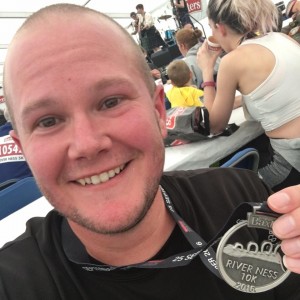 actually quite enjoyable feats. It started with the Poole 10k in June, which now feels a bit tame. At some point between the start of last year and now I became the sort of person that not only runs 10k races just for the fun of it, but is willing to travel the length of the UK to do one just because there’s a good medal at the end (as demonstrated in the picture – and if anyone’s interested, the River Ness 10k is brilliant. Down hill all the way).
actually quite enjoyable feats. It started with the Poole 10k in June, which now feels a bit tame. At some point between the start of last year and now I became the sort of person that not only runs 10k races just for the fun of it, but is willing to travel the length of the UK to do one just because there’s a good medal at the end (as demonstrated in the picture – and if anyone’s interested, the River Ness 10k is brilliant. Down hill all the way).
After the 10k came something I never thought I’d do (you’ll notice a recurring theme here) – a half marathon. Now, admittedly, four laps of Seaford seafront was not the most picturesque setting (and I’m a big fan of Seaford seafront, just not maybe in the rain with wet feet when you’ve already run up and down it three times) but it was nice to do something close to home. 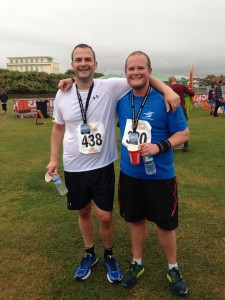 My brother David, who it turns out is a bit of a sneaky bastard, turned up the day before and announced he was doing it too, having been telling me for weeks how terribly injured he was and that he hadn’t been able to run for ages. This was my big target for 2015, and being able to cross the finish line arm in arm with my brother was a special experience that I will never forget. Even if I did shout at him at the beginning of the third lap for running five yards ahead of me and he told me off for crying at the end.
My brother David, who it turns out is a bit of a sneaky bastard, turned up the day before and announced he was doing it too, having been telling me for weeks how terribly injured he was and that he hadn’t been able to run for ages. This was my big target for 2015, and being able to cross the finish line arm in arm with my brother was a special experience that I will never forget. Even if I did shout at him at the beginning of the third lap for running five yards ahead of me and he told me off for crying at the end.
The third challenge of the year was at the other end of the country – the Great Scottish Swim. I’d been signed up a few years ago for the Great North Swim but for various comedic reasons that probably deserve a blog post of their own never got to complete the swim. This time though, everything went to plan. I flew up from Bournemouth to Glasgow, got a bus into the city and then a train out to Dumbarton. Quite the adventure. My sister in law, niece and nephew met me at the hotel for the night and then the following morning I donned my Speedos (yes really. You try and wear board shorts under a swimming wetsuit) and we drove over to Loch Lomond.
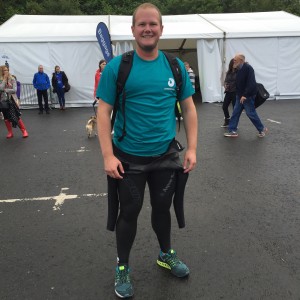 Now, I’m a strong swimmer. In my early twenties I spent a few years working as a lifeguard and a swimming teacher and the idea of swimming a mile without stopping doesn’t phase me. But this was so much tougher than I had anticipated. For one thing – it was COLD. The water temperature was only 12 degrees and as soon as you put your face in it, it took your breath away. While I knew the water quality would be completely different compared to pool swimming or even sea swimming, I hadn’t appreciated that I wouldn’t even be able to see my hand when my arm was at full extension. I’d wanted to enjoy this one, in the end it was about getting round and surviving. By the time I got to the end my legs were cramping up and my teeth were chattering, but I made it.
Now, I’m a strong swimmer. In my early twenties I spent a few years working as a lifeguard and a swimming teacher and the idea of swimming a mile without stopping doesn’t phase me. But this was so much tougher than I had anticipated. For one thing – it was COLD. The water temperature was only 12 degrees and as soon as you put your face in it, it took your breath away. While I knew the water quality would be completely different compared to pool swimming or even sea swimming, I hadn’t appreciated that I wouldn’t even be able to see my hand when my arm was at full extension. I’d wanted to enjoy this one, in the end it was about getting round and surviving. By the time I got to the end my legs were cramping up and my teeth were chattering, but I made it.
A week later, and still in Scotland, was the fourth event of the year – the ‘Beast Race’. A 10k obstacle race on the shores of Loch Ness. For this one I was part of a team of four – my brother David, sister in law Charlie, and their friend Julie. All three had been raising money for St Wilf’s despite not living anywhere near it, which was genuinely touching. 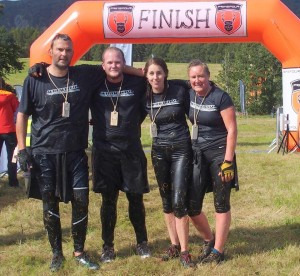 Once again, I was guilty of having underestimated the scale of the challenge. I knew I could comfortably run 10k, but I hadn’t factored in the additional demands of getting under/over/through the various obstacles. I also hadn’t eaten enough breakfast (note to self – two slices of toast doesn’t really cut it). For me though this wasn’t about getting round as quickly as possible, this was about doing something that I had never seen myself doing (I don’t even like getting sandy feet on the beach, so crawling down a tunnel into a bog full of pig poo was something of a departure). We finished, together (despite Charlie nearly drowning after sliding into Loch Ness and seemingly forgetting how to breath), and were rewarded with technical t-shirts, a unique custom medal, and a dirty burger. Only fair to say Dave looks knackered in the picture – but he finished the strongest of all of us.
Once again, I was guilty of having underestimated the scale of the challenge. I knew I could comfortably run 10k, but I hadn’t factored in the additional demands of getting under/over/through the various obstacles. I also hadn’t eaten enough breakfast (note to self – two slices of toast doesn’t really cut it). For me though this wasn’t about getting round as quickly as possible, this was about doing something that I had never seen myself doing (I don’t even like getting sandy feet on the beach, so crawling down a tunnel into a bog full of pig poo was something of a departure). We finished, together (despite Charlie nearly drowning after sliding into Loch Ness and seemingly forgetting how to breath), and were rewarded with technical t-shirts, a unique custom medal, and a dirty burger. Only fair to say Dave looks knackered in the picture – but he finished the strongest of all of us.
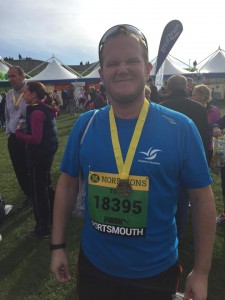 And so on to the final event of 2015, the Great South Run. A 10 mile jog around historic Portsmouth. Kind of poetic for me, as my previous forays into running had seen my first ‘proper’ race as the GSR 5k, which happens the day before the main event on part of the same course. This event has a reputation for crap weather – it’s normally cold and windy. On this day however the sun shone, the weather was glorious, and I wore my terminator sunglasses all the way round. As I crossed the line I knew my year of fundraising was over. But there was still an open question in my mind…
And so on to the final event of 2015, the Great South Run. A 10 mile jog around historic Portsmouth. Kind of poetic for me, as my previous forays into running had seen my first ‘proper’ race as the GSR 5k, which happens the day before the main event on part of the same course. This event has a reputation for crap weather – it’s normally cold and windy. On this day however the sun shone, the weather was glorious, and I wore my terminator sunglasses all the way round. As I crossed the line I knew my year of fundraising was over. But there was still an open question in my mind…
On 22nd December mum and I popped in to St Wilf’s to drop off the next instalment of cash. As we sat in the coffee shop (great cheese scones, by the way, if you’re passing) waiting to meet Darren from the fundraising team, a nearby TV screen was scrolling through Powerpoint slides. One of the slides enticingly suggested that running the Brighton Marathon might be an excellent way to raise money.
Now, let me talk to you about me and marathons. They’ve always fascinated me. Every single year since I don’t know when I’ve watched the coverage of London on the BBC and told myself that one year, I’d do that. Bear in mind that until 2015, I had never run further than 3 miles, and even that very very slowly and only very few times. But here I was now, in the habit of running, knowing that I was capable of anything as long as I put the effort in on training. Also, on both the Seaford half and the Great South Run I’d been wearing a branded Brighton Marathon t-shirt that I’d been given by my buddy Patrick. To be honest, while I loved the shirt, I felt like a bit of a fraud wearing it. It was time for me to prove myself worthy. The challenge was on.
So (after exchanging various emails and filling the forms in) I had a place in the 2016 Brighton Marathon running for St Wilf’s. Training started in January, in the rain, in Poole. I was following a training plan I’d downloaded from somewhere and had created a whole new iCloud calendar with all the required runs in it. At the same time though, I was starting a new job. For the first month of the training plan everything went well, I managed to fit my training runs in around my new work schedule (which involved quite a lot of European travel) and could feel my fitness improving. Then in early February I got what we now believe to have been my first bout of pneumonia (not that I knew it at the time). This took me out of training for three weeks. When I got back to training, my travel plans took me mainly to cold countries where there was snow on the ground and where running outside definitely wasn’t advisable (I did ask the locals, who suggested I go and buy some special snow running spikes, but I figured airport security probably wouldn’t like those in my hand luggage). At this point I was just trying to do as much as I could. I managed to stick with the weekend long runs, but once we got up to about 18 miles the mid week conditioning runs that I’d been skipping started to catch up with me. I was comfortable running to 15 or 16 miles, then I was walk/running to finish the distance.
My last long training run before I started the taper was due to be 22 miles, and I was in Seaford, on familiar territory. I set out though on a route I’ve never run before (the off road path from Bishopstone, through Norton over to Denton), found it waterlogged and very poor terrain, and wasted a massive amount of energy. By the time I got to Newhaven lifeboat station I’d done 13 miles, it was chucking it down with rain, and I knew I wasn’t going to make it to 22. I ran home, gutted. My last training run was five or six miles shorter than it should have been, but having finished the Cranleigh 21 miler the weekend before I knew I could make it that far, and then I’d just have to dig deep for the last five miles.
As the big day dawned the sun was shining and I was more excited than nervous. We decided to get the train over to Brighton (but I wouldn’t recommend it – park and ride in future, people) and I got in a last minute wee after queuing for the obligatory hour. I was in the slowest start group, and hung about at the start line to get a high five from Zoe Ball (which got me through at least the first 10k) which meant I was right at the back of the pack. I like that though, I’m not quick, but I’m not the slowest one out there either, so I was gradually picking people off and moving up through the group.
The first six miles, it’s fair to say, are easy. There’s lots of support in the town, lots to look at, and it’s not hard to stay focused on things that are happening outside of your own body. It doesn’t start to get hard until you’re on the coast road running out towards Roedean school, and by the time I’d finished that section and was coming down towards the pier again (at about half way) I was just thinking I might have a little rest and walk for a bit. Then the crowds kicked in.
There were people EVERYWHERE. It seemed like they were three or four deep. At that point the faster runners would have been finishing in about the same location and the noise was incredible. I felt amazing. 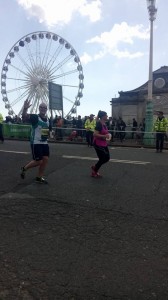 Then I heard someone call my name – it was my friend Triona, who had inspired me a few years earlier when she took up running and finished the marathon herself. Hearing the crowd support (and I’d had my name printed on my running vest, so lots of people were calling my name) and seeing a familiar face gave me a boost of energy far greater than the gels I’d been sucking for the last hour. I knew my mum and my girlfriend were only a few miles away now so I lifted my head, sucked in the atmosphere, and just kept going.
Then I heard someone call my name – it was my friend Triona, who had inspired me a few years earlier when she took up running and finished the marathon herself. Hearing the crowd support (and I’d had my name printed on my running vest, so lots of people were calling my name) and seeing a familiar face gave me a boost of energy far greater than the gels I’d been sucking for the last hour. I knew my mum and my girlfriend were only a few miles away now so I lifted my head, sucked in the atmosphere, and just kept going.
If Hove nearly killed me, it was Shoreham power station that finished me off.
The outward loop in Hove was lovely. A residential street full of families in their front gardens handing out jelly babies and playing ‘Don’t Stop Me Now’. I felt great, I was smiling, dancing, and high fiving. I knew I’d already run further than I’d ever run before and I was feeling confident. Somewhere between miles 18 and 19 though, it got quiet. I lost my mental strength, and I did something which I knew it would be very difficult to come back from. I stopped running, and started walking.
At some point in the future I’ll run a marathon again (me and London have unfinished business). When that happens I’ll know how to deal with the mental low that I hit somewhere in Hove in April. Just switch it off. Don’t listen. I’d had a mantra I my head which I’d written on my arm which I’d been repeating over and over again ‘I am fit enough, I am strong enough, I am prepared enough, I can do this’. When my legs were screaming at me to stop I could use this to drown it out and just keep going. But I let it go.
There was never any question of me not finishing, I knew I could make it, but at that point I was mixing running and walking, and mainly walking. Once I got on to that horrendous loop up round the power station my legs had given in. The electrolyte drink I’d been carrying was now so diluted it was basically just water and cramp was starting. I walked that whole loop. I passed three people passed out (they had medical help with them, I didn’t just step over their lifeless bodies) and one young guy with his head in his hands. It was hot, There was no support there. It was the closest I have been to hell. Well not really, but it was pretty shit. If you ever support anyone running that marathon, whatever they tell you, make sure there’s some support for them in that section. It’s tough.
Somewhere along the seafront when I knew I was on the home straight somebody offered me a sausage from their barbecue. For some ridiculous reason (probably British manners) I took it. I took one bite, then realised how foolish that was, and chucked it in the next bin. People of Brighton – offering sausages to delirious people who’ve just run/walked/crawled 23 miles is not wise. Stick to Jelly Babies.
At 25 miles something weird happened, which is difficult to talk about. At 25 miles, when my feet were killing me and my legs had nothing left, I heard a voice say ‘come on then, let’s go for a run’, and I started running. As clear as my computer is in front of me now, Dad was by my side. I was in the last mile of a marathon. People were calling my name and cheering me on. And Dad was running next to me. I had a little cry at that point. I’m not trying to be overly dramatic, or to make it more emotional than it needs to be. It’s just how it was. We ran the last mile together.
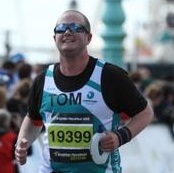 As I got to the very last section, even though there were lots of people watching, the crowd was really quiet. They were all waiting for their own runners to come through. I remember reading somewhere about not being afraid to egg the crowd on a bit to help you get over, so I pumped my arms a bit and got them cheering. Well screw it. How often does an overweight IT consultant get to cross a finish line with hundreds of people cheering? I crossed the line in just over five hours and thirty minutes and collected my medal, then walked another half a mile to get out of the finish area and the bag reclaim to go and find my family.
As I got to the very last section, even though there were lots of people watching, the crowd was really quiet. They were all waiting for their own runners to come through. I remember reading somewhere about not being afraid to egg the crowd on a bit to help you get over, so I pumped my arms a bit and got them cheering. Well screw it. How often does an overweight IT consultant get to cross a finish line with hundreds of people cheering? I crossed the line in just over five hours and thirty minutes and collected my medal, then walked another half a mile to get out of the finish area and the bag reclaim to go and find my family.
I have never been prouder of anything in my life.
This started out being about raising some money. It finished with me doing something that I never thought I would be capable of, and which changed the way I thought about myself. Every so often in life we have to push ourselves out of our comfort zones, get out there and find out what we’re really capable of. Three months later, I finished my first triathlon, and a week after that, I finally got to do the Great North Swim. The sense that ‘anything is possible’ has infiltrated every part of my life, and it’s all the better for it.
So yesterday, when we dropped the last bit of cash at St Wilf’s, we finished my ‘year’ of fundraising, at least for now. It’s time I stopped asking my friends for money every time I put my trainers on.
By my calculations, the final total which we raised (and it is we, rather than I, because this was very much a team effort) was a completely unexpected £2641.60.
Thank you, all of you, for your time, your support, and your generosity. It has been one of the most enjoyable and rewarding experiences of my life, and I’m grateful to you all for being a part of it.
The final thank you is to St Wilfrid’s. Again. For being there for us when we needed you, and for being there now and in the future, for those who are lucky enough to find you. There isn’t a vocabulary to describe what you do, the closest that I can get is that you bring light where there is darkness, literally and metaphorically, through love, care, and cheese scones. Thank you.
